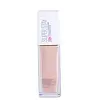Maybelline SuperStay 24H Full Coverage Foundation Versus Maybelline Shine-Free + Balance Stick Foundation
What's inside
What's inside
 Key Ingredients
Key Ingredients

 Benefits
Benefits

 Concerns
Concerns

 Ingredients Side-by-side
Ingredients Side-by-side

Water
Skin ConditioningIsododecane
EmollientDimethicone
EmollientAcrylates/Polytrimethylsiloxymethacrylate Copolymer
Skin ConditioningCellulose
AbsorbentLauryl PEG-9 Polydimethylsiloxyethyl Dimethicone
Skin ConditioningVinyl Dimethicone/Methicone Silsesquioxane Crosspolymer
PEG-10 Dimethicone
Skin ConditioningMagnesium Sulfate
Phenoxyethanol
PreservativeDisteardimonium Hectorite
StabilisingSodium Hyaluronate
HumectantDimethicone/Polyglycerin-3 Crosspolymer
CleansingCetyl PEG/PPG-10/1 Dimethicone
EmulsifyingSilica Silylate
EmollientSilica
AbrasiveTriethoxycaprylylsilane
Propylene Carbonate
SolventCaprylyl Glycol
EmollientXanthan Gum
EmulsifyingTrisodium Ethylenediamine Disuccinate
Ethylhexylglycerin
Skin ConditioningAlumina
AbrasiveDisodium Stearoyl Glutamate
CleansingDipropylene Glycol
HumectantAluminum Hydroxide
EmollientTocopherol
AntioxidantPentaerythrityl Tetra-Di-T-Butyl Hydroxyhydrocinnamate
AntioxidantWater, Isododecane, Dimethicone, Acrylates/Polytrimethylsiloxymethacrylate Copolymer, Cellulose, Lauryl PEG-9 Polydimethylsiloxyethyl Dimethicone, Vinyl Dimethicone/Methicone Silsesquioxane Crosspolymer, PEG-10 Dimethicone, Magnesium Sulfate, Phenoxyethanol, Disteardimonium Hectorite, Sodium Hyaluronate, Dimethicone/Polyglycerin-3 Crosspolymer, Cetyl PEG/PPG-10/1 Dimethicone, Silica Silylate, Silica, Triethoxycaprylylsilane, Propylene Carbonate, Caprylyl Glycol, Xanthan Gum, Trisodium Ethylenediamine Disuccinate, Ethylhexylglycerin, Alumina, Disodium Stearoyl Glutamate, Dipropylene Glycol, Aluminum Hydroxide, Tocopherol, Pentaerythrityl Tetra-Di-T-Butyl Hydroxyhydrocinnamate
Ethylhexyl Palmitate
EmollientMethyl Methacrylate Crosspolymer
Hydrogenated Polyisobutene
EmollientPolyethylene
AbrasivePhenyl Trimethicone
Skin ConditioningNylon-12
Diisostearyl Malate
EmollientOzokerite
Emulsion StabilisingPolyvinyl Laurate
Disteardimonium Hectorite
StabilisingCaprylyl Glycol
EmollientPropylene Carbonate
SolventCI 77220
Cosmetic ColorantZinc PCA
HumectantAcrylonitrile/Methyl Methacrylate/Vinylidene Chloride Copolymer
CI 77891
Cosmetic ColorantCI 77491
Cosmetic ColorantCI 77492
Cosmetic ColorantCI 77499
Cosmetic ColorantMica
Cosmetic ColorantFish Oil
Skin ConditioningIsononyl Isononanoate
EmollientDimethicone
EmollientCera Microcristallina
Emulsion StabilisingSilica
AbrasiveCopernicia Cerifera Cera
EmollientVinyl Dimethicone/Methicone Silsesquioxane Crosspolymer
Dimethicone Crosspolymer
Emulsion StabilisingTocopheryl Acetate
AntioxidantLauryl Methacrylate/Glycol Dimethacrylate Crosspolymer
Ethylhexyl Palmitate, Methyl Methacrylate Crosspolymer, Hydrogenated Polyisobutene, Polyethylene, Phenyl Trimethicone, Nylon-12, Diisostearyl Malate, Ozokerite, Polyvinyl Laurate, Disteardimonium Hectorite, Caprylyl Glycol, Propylene Carbonate, CI 77220, Zinc PCA, Acrylonitrile/Methyl Methacrylate/Vinylidene Chloride Copolymer, CI 77891, CI 77491, CI 77492, CI 77499, Mica, Fish Oil, Isononyl Isononanoate, Dimethicone, Cera Microcristallina, Silica, Copernicia Cerifera Cera, Vinyl Dimethicone/Methicone Silsesquioxane Crosspolymer, Dimethicone Crosspolymer, Tocopheryl Acetate, Lauryl Methacrylate/Glycol Dimethacrylate Crosspolymer
 Reviews
Reviews

Ingredients Explained
These ingredients are found in both products.
Ingredients higher up in an ingredient list are typically present in a larger amount.
Caprylyl Glycol is a humectant and emollient, meaning it attracts and preserves moisture.
It is a common ingredient in many products, especially those designed to hydrate skin. The primary benefits are retaining moisture, skin softening, and promoting a healthy skin barrier.
Though Caprylyl Glycol is an alcohol derived from fatty acids, it is not the kind that can dry out skin.
This ingredient is also used as a preservative to extend the life of products. It has slight antimicrobial properties.
Learn more about Caprylyl GlycolDimethicone is a type of synthetic silicone created from natural materials such as quartz.
What it does:
Dimethicone comes in different viscosities:
Depending on the viscosity, dimethicone has different properties.
Ingredients lists don't always show which type is used, so we recommend reaching out to the brand if you have questions about the viscosity.
This ingredient is unlikely to cause irritation because it does not get absorbed into skin. However, people with silicone allergies should be careful about using this ingredient.
Note: Dimethicone may contribute to pilling. This is because it is not oil or water soluble, so pilling may occur when layered with products. When mixed with heavy oils in a formula, the outcome is also quite greasy.
Learn more about DimethiconeDisteardimonium Hectorite comes from the clay mineral named hectorite. It is used to add thickness to a product.
It can also help stabilize a product by helping to disperse other ingredients.
Hectorite is a rare, white clay mineral.
Learn more about Disteardimonium HectoriteThis ingredient is a solvent. It helps dissolve active ingredients and alter the texture of products.
Propylene Carbonate is commonly used in makeup and with clay, such as montmorillonite or bentonite.
Studies show this ingredient to be safe for cosmetics. When it is undiluted, it can cause skin irritation. (It is always diluted in skincare and makeup). This ingredient is water-soluble.
Propylene Carbonate is created from propylene glycol and carbonic acid.
Learn more about Propylene CarbonateSilica, also known as silicon dioxide, is a naturally occurring mineral. It is used as a fine, spherical, and porous powder in cosmetics.
Though it has exfoliant properties, the function of silica varies depending on the product.
The unique structure of silica enhances the spreadability and adds smoothness, making it a great texture enhancer.
It is also used as an active carrier, emulsifier, and mattifier due to its ability to absorb excess oil.
In some products, tiny microneedles called spicules are made from silica or hydrolyzed sponge. When you rub them in, they lightly polish away dead skin layers and enhance the penetration of active ingredients.
Learn more about SilicaThis ingredient is used in makeup and skincare to thicken formulas, reduce shine, and give skin a silky-smooth feel.
It’s a white silicone powder that sits in fine lines and pores to blur their appearance though its effectiveness depends on the particle size.
You'll typically find this ingredient in amounts between 0.1-20%.
Learn more about Vinyl Dimethicone/Methicone Silsesquioxane Crosspolymer